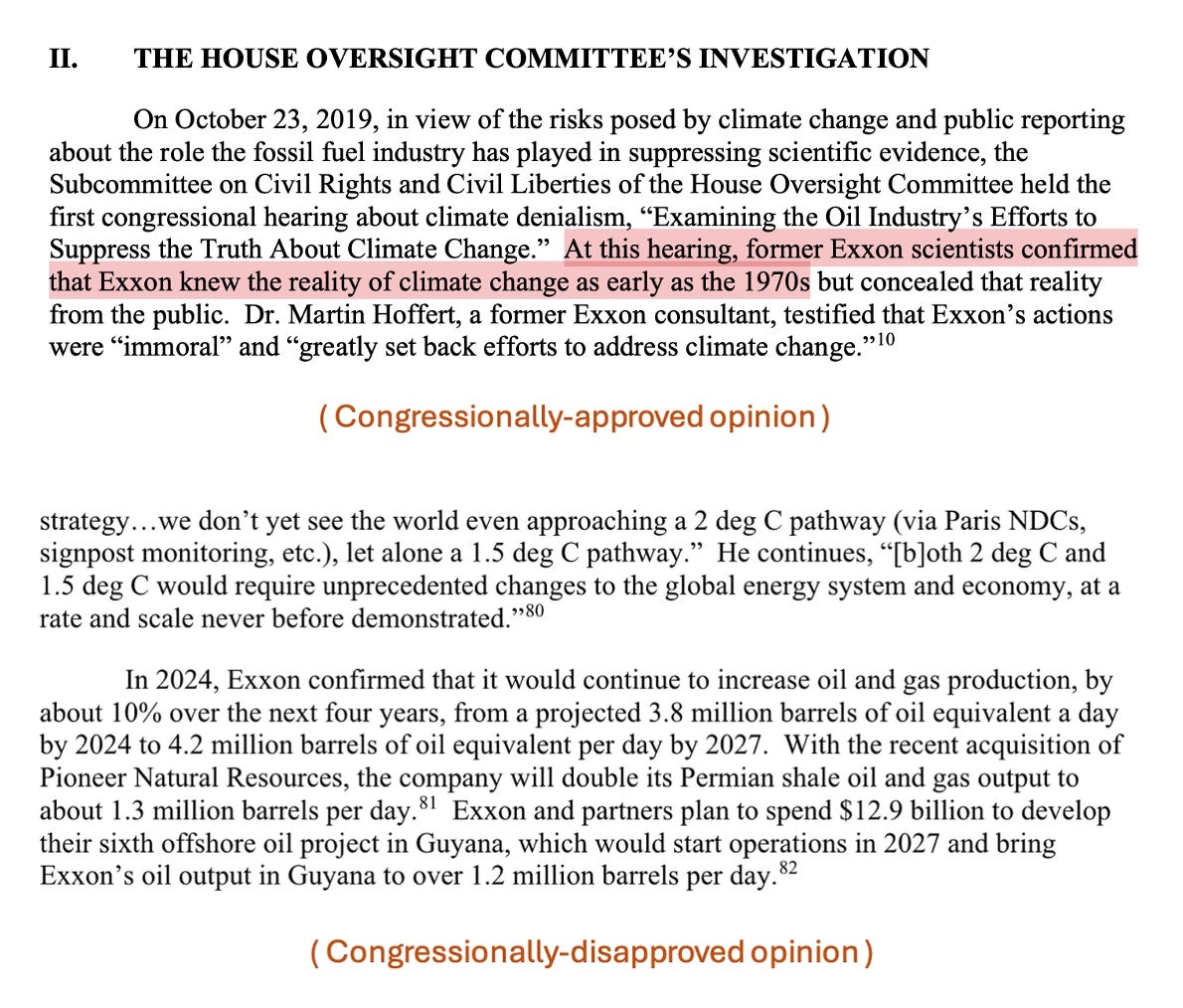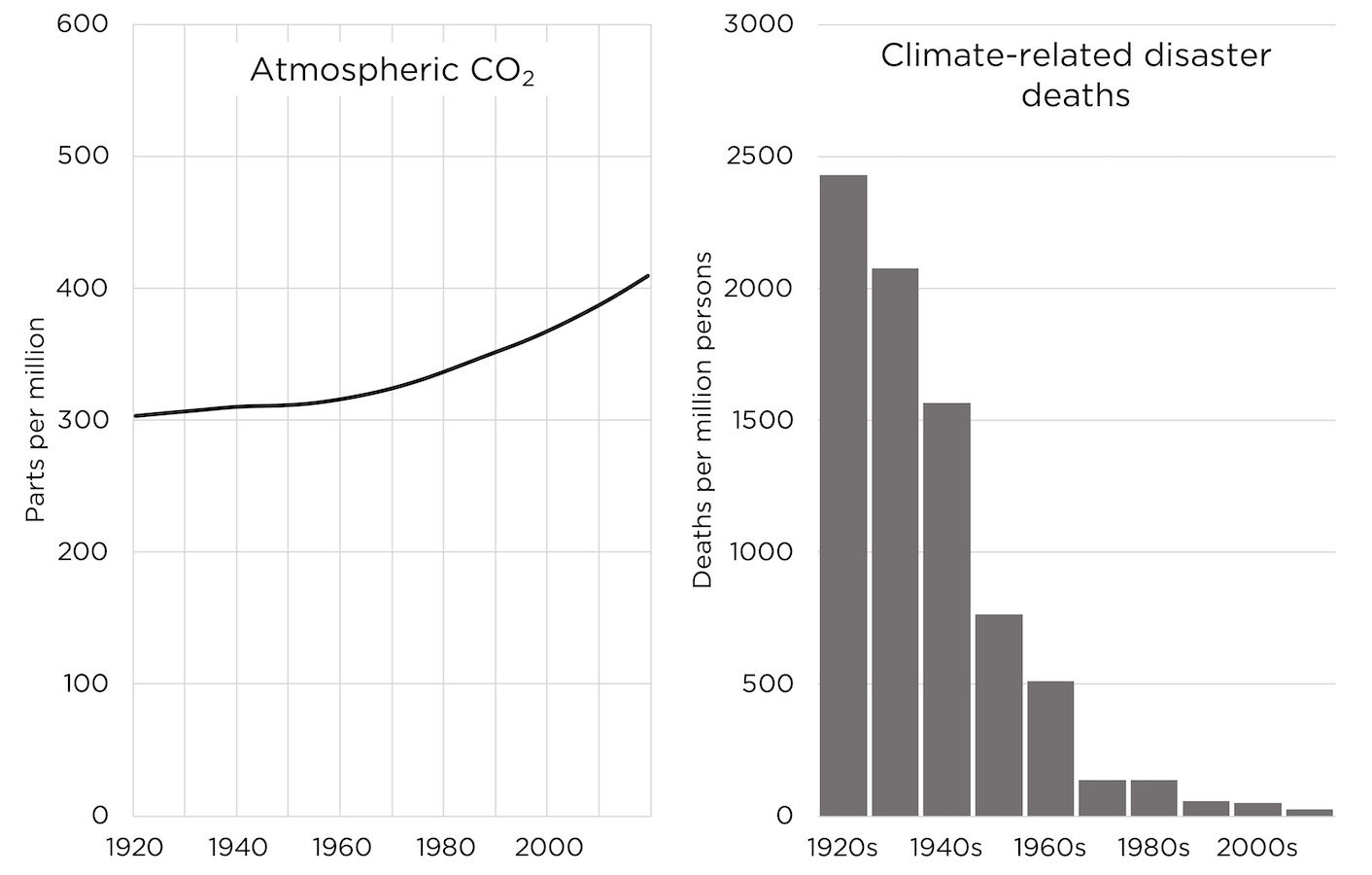The fossil fuel industry should defend itself against Congressional smears
A group of Congressional catastrophists is threatening the fossil fuel industry for "extensive efforts" in its communications to "undermine efforts to curb GHG emissions."
[The Energy Talking Points newsletter provides concise, powerful, well-referenced talking points on the latest energy, environmental, and climate issues from a pro-human, pro-freedom perspective. To get more talking points check out EnergyTalkingPoints.com and AlexAI.]
A group of Congressional catastrophists is threatening the fossil fuel industry for “extensive efforts” in its communications to “undermine efforts to curb greenhouse gas emissions.”
But the industry has a First Amendment right to do this—and should actually have done far more.1
A new 65-page Congressional report uses one fallacy over and over: showing that some internal opinion at a company conflicts with its public opinions or actions, then accusing the company of dishonesty. But such conflicts are inevitable when you employ thousands of people!2
Note that where an internal opinion favors rapid greenhouse gas restrictions, the Congressional report supports it. But where an internal opinion is against restrictions, the report opposes it.
Clearly the report just wants fossil fuel companies to follow its authors' political opinions.3
The report’s cited documents of fossil fuel companies reveal that regarding the climate effects of fossil fuels, there has been reasonable disagreement over their nature (how negative or positive), magnitude, and policy implications (what we should do given the many offsetting benefits of fossil fuels).
Instead of recognizing the complexity of assessing the nature, magnitude, and policy implications of fossil fuels’ climate effects, the Congressional report pretends it’s obvious that these effects are exclusively negative and enormous, and that fossil fuels have no offsetting benefits.
It can be determined that policy analysis of this entire “report” is garbage by its omission of three essential considerations:
1 The overall benefits of fossil fuels
2 The climate-related benefits of fossil fuels
3 The fact that we’re safer from climate than everThe benefits of fossil fuels
When we’re evaluating what to do about any product we must factor in not only its negative side-effects but also its benefits.
E.g., oil-powered equipment and natural gas fertilizer are crucial to feeding 8 billion people.
But the report mentions no such benefits!The climate-related benefits of fossil fuels
One huge benefit we get from fossil fuels is the ability to master climate danger—e.g., fossil fueled cooling, heating, irrigation—which can neutralize many of fossil fuels’ negative climate impacts.
But the report mentions no such benefits!The fact that we’re safer from climate than ever
Fossil fuels have helped drive down climate disaster deaths by 98% over the last century by powering the amazing machines that protect us against storms, extreme temperatures, and drought.
The report doesn’t mention this at all!4The “Denial, Disinformation, and Doublespeak” report’s purpose in attacking the fossil fuel industry for having opinions opposed to rapid greenhouse gas reductions is not academic; it is to use the force of government to “hold Big Oil accountable”—i.e., to threaten and punish the industry.5
The Congressional report's combination of 1) pretending that legitimate criticism of rapid greenhouse gas reductions cannot exist and 2) publicly threatening companies for expressing such criticisms internally and externally is intellectually disreputable and an attack on the 1st Amendment.
Our Constitution says that “Congress shall make no law… abridging the freedom of speech.” This applies to all of us, including fossil fuel companies and employees. And yet Congress is publicly attacking companies and employees who express opinions opposing rapid greenhouse gas reductions.
The government has no right to interrogate oil companies unless it has evidence that they are committing fraud by concealing or fabricating evidence. In the case of the climate impact of greenhouse gases, this is impossible—because all the evidence is in the public domain.
There is a fundamental distinction in civilized society between fraud and opinion. By calling dissenting opinions fraud, Congressional climate catastrophists are trying to make independent thought a crime. To do this in the name of science is obscene.
Science thrives on the open, competitive exchange of evidence and arguments--not of suppressing dissenters. True scientists can win on the competitive market of ideas. Only those with fallacious conclusions are desperate for government to descend on their opponents.
Further proving the extent to which Congressional climate catastrophists are unconcerned with the law but rather lawlessly imposing their opinions, observe that they have shown no interest in the rampant fraud of companies who claim to be “100% renewable” to gain favor and customers.
As I and many others have documented, any company that claims to be “100% renewable” in its electricity is lying—usually by paying grids to get credit for others’ solar and wind electricity and blaming others for the paying company’s gas and coal electricity.
Here are exposes of some of the dozens of companies that lie about being “100% renewable.”
https://www.forbes.com/sites/alexepstein/2016/01/08/the-truth-about-apples-100-renewable-energy-usage/
https://alexepstein.substack.com/p/exposing-corporate-energy-liars-budweiserWhy is there not “disinformation” focus on demonstrably fraudulent 100% renewable claims? Because this fraudulent “disinformation” is in support of the Congressional catastrophists’ agenda of rapidly eliminating greenhouse gas emissions.
While government attacking fossil fuel companies for their First Amendment-protected opinions against rapid greenhouse gas restrictions is illegitimate, private citizens should criticize many companies for an opposite reason: their opposition to greenhouse gas restrictions has been way too weak.
For decades, many fossil fuel companies have increasingly expressed opinions that concede climate catastrophism, fail to articulate the unique benefits of fossil fuels, and even endorsed the catastrophic policy of “net zero by 2050.”
This is what they should be criticized for.Fossil fuel companies should say two things when threatened for expressing pro-fossil-fuel opinions: 1) We have a 1st Amendment right to our opinions on energy and climate, and 2) We are now going to talk a lot more about the benefits, including climate benefits, of our industry.
Popular links
EnergyTalkingPoints.com: Hundreds of concise, powerful, well-referenced talking points on energy, environmental, and climate issues.
My new book Fossil Future: Why Global Human Flourishing Requires More Oil, Coal, and Natural Gas—Not Less.
“Energy Talking Points by Alex Epstein” is my free Substack newsletter designed to give as many people as possible access to concise, powerful, well-referenced talking points on the latest energy, environmental, and climate issues from a pro-human, pro-energy perspective.
UC San Diego - The Keeling Curve
For every million people on earth, annual deaths from climate-related causes (extreme temperature, drought, flood, storms, wildfires) declined 98%--from an average of 247 per year during the 1920s to 2.5 per year during the 2010s.
Data on disaster deaths come from EM-DAT, CRED / UCLouvain, Brussels, Belgium – www.emdat.be (D. Guha-Sapir).
Population estimates for the 1920s from the Maddison Database 2010, the Groningen Growth and Development Centre, Faculty of Economics and Business at University of Groningen. For years not shown, population is assumed to have grown at a steady rate.
Population estimates for the 2010s come from World Bank Data.






I watched your recent discussion at EarthX on the CIP (Center for Industrial Progress) YouTube page, and I thought you won that debate with your opening statement.
Your opponent (I believe his name is Steve) outwardly maintained his composure using loaded words like “dangerous” offhand to characterize any man-made climate change while not addressing any of the points you made.
Sooner or later, truth should prevail. Sooner or later, the voices of reason like yours should prevail. I write this short note to encourage you to keep on going! I think in the end rational thinking will prevail, although we have a long hard road ahead of us.